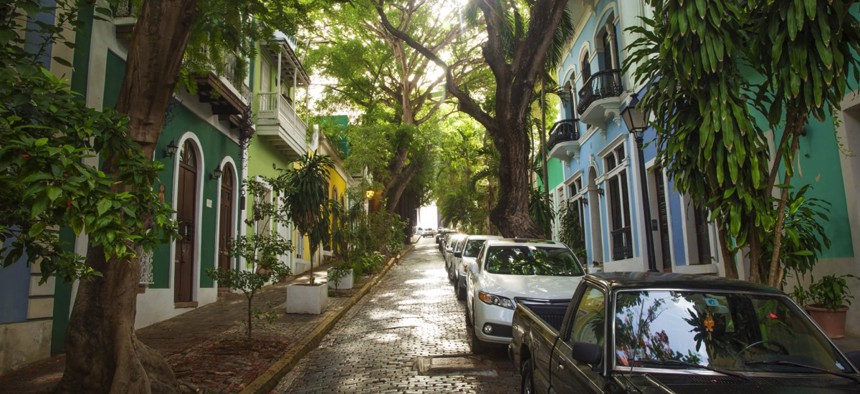Puerto Rico Debt Default All But Certain, a Rating Agency Warns

A street in San Juan, Puerto Rico. mikolajn / Shutterstock.com
Analysts at Moody’s Investors Service also say that investors are set to take a big hit when it comes to recovering what they’re owed.
The outlook on Puerto Rico’s financial crisis remains grim. Analysts at a top credit ratings agency said on Wednesday that the U.S. commonwealth will almost certainly default on its debts, and investors will likely sustain heavy losses.
“We believe that the probability of default is approaching 100 %, and that losses given default are substantial,” analysts at Moody’s Investors Service said in a “Frequently Asked Questions” document issued Wednesday afternoon about the ongoing financial problems in Puerto Rico.
The central government and other public entities on the island are loaded down with about $73 billion of debt. In late June, Gov. García Padilla called these obligations "unpayable."
The Moody’s analysts also cast doubt on the degree to which congressional legislation—that would enable some public entities in Puerto Rico to file for bankruptcy—would help the situation.
“We would expect that a large portion of Puerto Rico’s debt would not be eligible for bankruptcy restructuring,” they wrote.
Puerto Rico is currently not covered by Chapter 9 of the federal bankruptcy code, which allows insolvent municipalities and public authorities in U.S. states to file for bankruptcy protection.
That would change under a bill Democratic Sens. Richard Blumenthal of Connecticut and Charles Schumer of New York introduced last Wednesday.
The legislation would make it possible for public entities in the commonwealth, such as utilities, to file for bankruptcy. But states are not eligible for Chapter 9, and Blumenthal has made it clear that the bill would also make that true for Puerto Rico’s central government.
According to Moody’s, more than $18 billion of Puerto Rico’s outstanding debt is in the form of general obligation bonds, and other securities guaranteed by the central government itself.
General obligation bondholders have special legal protections that give them first dibs on available government resources. But the Moody’s analysts pointed out that “it will be hard for the commonwealth to achieve significant fiscal relief through debt restructuring if it completely excludes GO and guaranteed bonds.” They also noted Puerto Rico has signaled that the general obligation debt would not be immune from restructuring.
Whether the Chapter 9 bill can gain enough Republican support in Congress to win approval is also uncertain. Schumer said last week that he had discussed the legislation with about a half-dozen Republican colleagues. But so far none have stepped forward as co-sponsors.
On Thursday afternoon, the bill’s co-sponsors totalled 13, all of them Democrats, except for Vermont Independent Sen. Bernie Sanders.
Of the Puerto Rico debt Moody’s has rated, the agency estimates that investors will recover 35 to 80 percent of what they are owed in the event of a default, depending on the type of obligation and the issuer.
Prior to the crisis, Puerto Rico bonds were popular among municipal investors due to their “triple tax exemption" status, meaning interest was not subject to federal, state or local income taxes.
Fitch Ratings noted on Monday that in response to the island’s financial problems, “hedge funds and distressed debt investors have expanded their holdings of Puerto Rico, replacing many of the traditional retail holders.”
Bill Lucia is a Reporter for Government Executive’s Route Fifty.
NEXT STORY: The Ever-Improving Online Services and Security of L.A.'s City Websites






